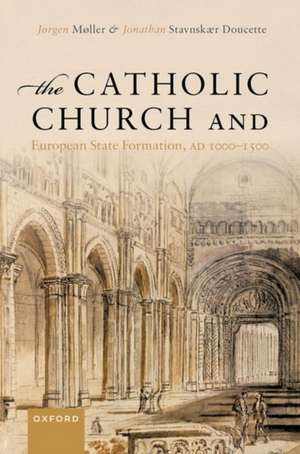The Catholic Church and European State Formation, AD 1000-1500
Autor Jørgen Møller, Jonathan Stavnskær Doucetteen Limba Engleză Hardback – 7 iul 2022
Preț: 564.97 lei
Preț vechi: 697.50 lei
-19% Nou
Puncte Express: 847
Preț estimativ în valută:
108.11€ • 117.80$ • 91.10£
108.11€ • 117.80$ • 91.10£
Carte disponibilă
Livrare economică 03-17 aprilie
Livrare express 19-25 martie pentru 86.22 lei
Preluare comenzi: 021 569.72.76
Specificații
ISBN-13: 9780192857118
ISBN-10: 0192857118
Pagini: 238
Dimensiuni: 163 x 240 x 19 mm
Greutate: 0.29 kg
Editura: OUP OXFORD
Colecția OUP Oxford
Locul publicării:Oxford, United Kingdom
ISBN-10: 0192857118
Pagini: 238
Dimensiuni: 163 x 240 x 19 mm
Greutate: 0.29 kg
Editura: OUP OXFORD
Colecția OUP Oxford
Locul publicării:Oxford, United Kingdom
Recenzii
Recommended. Advanced undergraduates through faculty.
This is an interesting and original book authored by two political scientists. Its terminology and modes of argumentation are not those familiar to historians but the work's basic thesis is at least plausible and perhaps even persuasive.
This is an interesting and original book authored by two political scientists. Its terminology and modes of argumentation are not those familiar to historians but the work's basic thesis is at least plausible and perhaps even persuasive.
Notă biografică
Jørgen Møller is Professor at the Department of Political Science, Aarhus University, Denmark, where he teaches Comparative Politics and International Relations. He has a PhD from the European University Institute, Italy. His research interests include conceptualization of democracy and the rule of law, dynamics of democratization, conflict and democratic stability, patterns of state formation, regime change and international order, and comparative methodology. Most of his recent work revolves around the medieval origins of the modern state and modern democracy. His work has been published in journals such as International Studies Quarterly, Perspectives on Politics, Journal of Politics, International Organization, and Sociological Methods & Research and in books with Routledge, Palgrave Macmillan, and Oxford University Press. Since 2015, he has been a member of The Royal Danish Academy of Sciences and Letters.Jonathan Stavnskær Doucette is Assistant Professor at the Department of Political Science, Aarhus University, Denmark, where he teaches Comparative Politics. He has a PhD from Aarhus University, which was awarded in 2020 and concerned the roots of medieval urban self-government. His research interests include democratization, the influence of religion on regime change, and the consequences of state building. His work has been published in journals such as International Organization, British Journal of Political Science, and Perspectives on Politics. It examines the religious causes of urban regime change, and the role of the state in determining democratic success.
